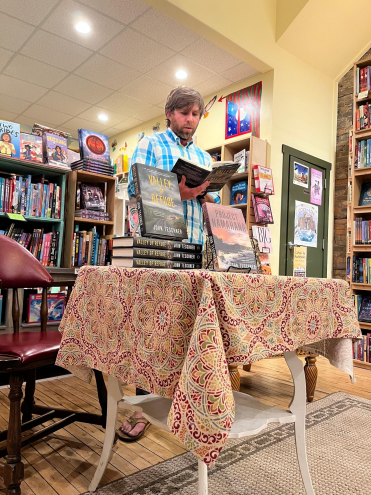John Teschner offers special insight on new novel “Valley of Refuge” at Zenith bookstore
John Teschner reads from “Valley of Refuge” at Zenith bookstore. Photo by Delaney Shipman
UMD professor John Teschner recently released his second thriller “Valley of Refuge”. It’s an attempt at capturing the struggles that many Hawaiian residents face—including environmental compromises, eco-tourism and homelessness. On the evening of its release on Oct. 3, Teschner’s friends, family and a handful of supportive Duluthians, gathered in the Zenith Bookstore to hear him read from and elaborate on “Valley of Refuge”.
“I was aiming to ‘smuggle’ the knowledge in,” Teschner said.
Though he now lives and teaches in Duluth, Teschner spent four years living in Hawaii with his wife and son. During this time, Teschner wrote his first novel—a gritty mystery set in Hawaii. Then, being signed to write two novels, Teschner began working on his second novel, “Valley of Refuge” over the course of a year in Duluth.
In a similar vein to his first novel, “Valley of Refuge” is a dark, environmentally-concerned thriller set in Hawaii. It encompasses three characters whose lives converge in Hawaii: a tech billionaire, a Hawaiian local and a transient.
Throughout his reading, Teschner noted experiences that influenced his writing, like the rumor in Hawaii that the government gives homeless people a one-way ticket to Hawaii as a way of getting them out of the continental states. This manifests in “Valley of Refuge” as a character who wakes up on a plane to Hawaii with no idea how she got there.
After the reading, Teschner welcomed questions. He talked a lot about his writing process. “Valley of Refuge” uses a lot of Pidgin, which is a language spoken in Hawaii besides the English and Hawaiian taught in school.
Teschner added this element because he wanted the Hawaiian setting to feel authentic. He said it was hard to write this novel in Minnesota because he wasn’t hearing Pidgin every day and had to do a lot of research to maintain its integrity.
Teschner finds it important to do thorough research because he wanted to educate himself as a white man speaking on the Hawaiian experience and to accurately capture the everyday life and struggles of Hawaiian people. He believes that there’s a “shared humanity” between all people. He brought his own life experiences to this book as well as the personal life experiences of Hawaiian locals, divers and homeless people.
Overall, this novel was a big project. If Teschner had to do the whole writing process over again, he said, smiling: “I wouldn’t choose to write these novels.”
Want to attend a book launch yourself? Jean Sramek, a bookseller at Zenith noted that the frequency of these book launches varies. Zenith had two in the first week of October and another the week afterward.
Other holiday-themed events will follow through Nov. and Dec. such as the Boozy Book Fair and Sacred Serpents. Sramek has worked at Zenith for two and a half years. She enjoys the book launches because it’s a great opportunity to connect with the authors, as well as being personally exciting for her.

